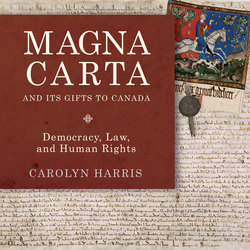Читать книгу Magna Carta and Its Gifts to Canada - Carolyn Harris - Страница 5
На сайте Литреса книга снята с продажи.
Foreword
ОглавлениеIt has been a great pleasure to lend my support to the tireless work of Len Rodness, Suzy Rodness, and the entire team at Magna Carta Canada. Thanks to their initiative and hard work, Canadians across our country will have a chance to view an original copy of Magna Carta and its companion document, the Charter of the Forest, on Canadian soil in 2015. I encourage all Canadians, and especially young Canadians, to take advantage of this potentially once-in-a-lifetime opportunity to see an original copy of this eight-hundred-year-old document, and to take a moment to learn more about the historical significance of Magna Carta.
When I was a teenager my father gave me a framed replica of Magna Carta as a gift. While I may not initially have fully appreciated the merits of such a gift, it nonetheless hung in my bedroom and eventually became an object of my curiosity.
Growing up, my father and I frequently discussed historical issues and often Magna Carta became a sort of frame of reference for many of our discussions. As I went on to pursue my studies at university in history and political science — and as I took my first job in politics — that framed gift came with me, both as inspiration for my interests and as a foundational reference for my own beliefs.
One of the great strengths of Magna Carta — and indeed one of the reasons for its enduring legacy — is that there is a little bit in there for nearly everyone. When we consider its place in history it is in some ways surprisingly comprehensive. Not only did it break ground in terms of establishing the primacy of the rule of law, but it also spoke to issues like the balance of power in politics, limits on government, individual rights, prohibition against arbitrary arrest, the economy, the independence of the Church, and many others. If you have a general interest in political science, there is certainly a strong likelihood that those specific issues you care most about can trace some reference to a clause contained in Magna Carta.
While the breadth of material contained within Magna Carta is certainly noteworthy, I think that its most fascinating characteristic is that it represented a revolution seeking to uphold the vast majority of a particular order, rather than an effort to bring an entire order down and start anew. Most revolutions or civil wars throughout history have sought either to achieve “regime change” or to turn the economic or social order upside down. At Runnymede, the barons were not trying to install a new ruler, or abolish long standing institutions. They were trying to protect these institutions by boldly putting forth basic and immutable limits on rulers. It signalled a desire to end the arbitrary and punitive use of power that was all too common to absolute rule. In many ways, it was a traditionalist revolution.
Fundamentally, Magna Carta is an acknowledgement of the inherent rights of human beings; rights that are found in natural law, not the positive law of kings or princes. That even the absolute power of a monarch has natural limits. As a result space was created for parliaments, for the notion that governors required the consent of the governed, and eventually for democracy itself.
While the document was annulled not long after receiving King John’s seal, the principles enshrined in Magna Carta and the overarching idea that there are natural limits to political power, nevertheless endured. Indeed the very idea of Magna Carta became so popular that King John’s successors had little choice but to reissue the document. With time, and with successive monarchs renewing their commitment to the principles of Magna Carta, it became a political institution unto itself. What began as a bold and even revolutionary idea, had taken hold.
The issuance of Magna Carta was, in many ways, the birth of our system of government and why this year’s celebrations are so significant.
It has truly been a personal thrill to be involved in the efforts to bring an original copy of Magna Carta to Canada in 2015. Once again I want to thank Len Rodness, Suzy Rodness, and the entire Magna Carta Canada team for their hard work providing a wonderful celebration of the eight-hundredth anniversary of Magna Carta here in Canada.
In closing, I am especially looking forward to sharing this experience with my own children, and perhaps purchasing a framed copy for them, much in the same way my father did for me so many years ago. While it may be that, like me, they will not immediately appreciate such a gift, I can only hope that they too will one day grow to realize that Magna Carta is in fact among the greatest gifts that we have ever passed down from one generation to the next.
I congratulate Magna Carta Canada for their wonderful work and thank them for providing so many Canadians with this truly once in a lifetime opportunity.
Andrew Scheer, MP
Speaker of the House of Commons
